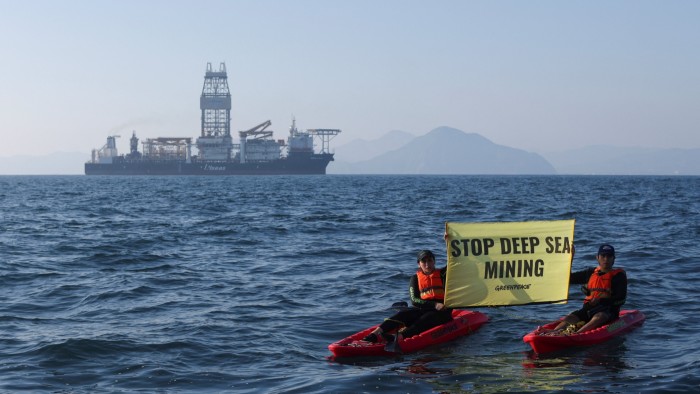Unlock the Editor’s Digest for free
Roula Khalaf, Editor of the FT, selects her favourite stories in this weekly newsletter.
“It’s better down where it’s wetter,” crooned Sebastian, the Disney crab, to the Little Mermaid. The sentiment is enthusiastically shared by a group of investors who have bet millions on extracting useful metals from the seabed. A political push for US self-reliance in strategic commodities will be music to their long-suffering ears.
President Donald Trump is expected to issue an executive order that would step up plans to harvest polymetallic nodules that form beneath the Pacific. These black lumps are rich in nickel, cobalt and manganese — commodities heavily used in the making of batteries for mobile devices and electric vehicles. Nickel also factors in the production of stainless steel, enhancing its industrial significance.
Deep-sea nodule harvesting is controversial because the seabed, and the consequences of scraping it, remain somewhat mysterious. Few mining trials have been undertaken. Sessile megafauna — large organisms attached the ocean floor — are presumably not fans. Non-government organisations, and many countries including the UK, want a moratorium. For Trump to issue permits without the oversight of the International Seabed Authority (ISA) would directly challenge the global consensus.
But in the eyes of a president who sees trade ties with economic rivals as vulnerabilities, there is a geopolitical imperative at stake. China dominates production of strategic metals, and has restricted exports of some in response to US tariffs. Tapping supply closer to home is at the very least a negotiating chip the White House can use for keeping global supply lines open, and an insurance policy in case they are closed.
Whether this will transform US geopolitical fortunes is unclear — though it would certainly be a sea change for The Metals Company, a listed prospector that has been lobbying hard for permission to start trawling. TMC went public in 2021 by merging with a special purpose acquisition company. The deal, handled by Citigroup and Nomura, was a flop. The shares, despite doubling this year, are 80 per cent below their early peak.
A Trump go-ahead would most probably bring a timely infusion of cash into the sector from outside investors. TMC had $3.5mn on its balance sheet at the end of 2024, and a loan facility part-funded by chief executive Gerard Barron. The company estimated in 2021 that it would need $7bn to get to full production, though the addition of partner companies will have brought that down since. A rival deep-sea hopeful, Loke Marine Minerals, recently filed for bankruptcy.
Granted, even with funding and White House approval, marine-mineral supremacy is a distant prospect. The ISA, a UN offshoot that claims jurisdiction over the high seas, may cry foul. Nonetheless, Trump has shown a knack for creating dramatic — if temporary — investment booms. With tariffs freezing trade opportunities on land, perhaps Sebastian was right: it is hotter under the water.
